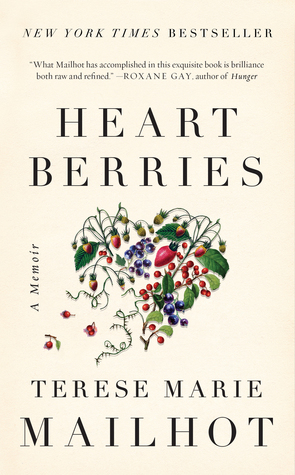
Heart Berries
Terese Marie Mailhot
Doubleday Canada
Review by Cody Caetano
Often when I’m reading memoir, I’ll remember a quote from a misguided Neil Genzlinger, who penned “The Problem With Memoirs” for The New York Times in 2011: “There was a time when you had to earn the right to draft a memoir… Sure, [Amazon] has authors who would be memoir-eligible under the old rules. But they are lost in a sea of people you’ve never heard of” (italics mine). It is important to note that marginalized memoirists, especially early-career Indigenous women, Two-Spirit, and queer folks, have fraught histories with Genzlinger-types, their “old rules” and antiquated tastes that mar the merit of writing, publishing, and participating in the predominantly white spaces of the literary world. And then along comes Terese Marie Mailhot, a Salish First Nation woman from Seabird Island Indian Reservation with the assertion that memoir “functions as something vulnerable in a sea of posturing” (137). And it is in vulnerability that Mailhot effectively rejects the moth-eaten straightjacket that would otherwise restrict the inventive, decolonial confession of Heart Berries.
In a debut offering perhaps the heaviest assemblage of blood memory in recent years, Heart Berries is Mailhot’s harrowing account of a cavernous psychiatric hospital, the colonized, impoverished childhood that brought her there, and the book she wrote to make it through both: “I told the staff this is my journal” (17; italics mine). What began as a therapy notebook would later evolve into a chaotic collection of ominous traumas that will sit big with Indigenous audiences, people for whom the “story became the hustle,” (3) as Mailhot blunts in her opening entry, “Indian Condition.” And what a hustle it is: eleven slow-burning essays capped at 135 pages, I assure the first reading will take more than an expected afternoon or two, if you’re digesting the heft each piece dispenses.
Originally formulated as fiction, Heart Berries emerged after a coffee-shop rememory manifested a repressed childhood horror in Mailhot’s adult interior, arriving in one, then two words at a time for her to confront what “refused to heal over” (73). Mailhot’s confrontation with her memory and her mother (who shut out the possibility of her child’s trauma) sets the through-line, which worries less about a linear, circular structure than it does about particular affects like Lack (“The Leaving Deficit”) or Absence (“I Know I’ll Go”). And that’s where Heart Berries thrives: when it gives way to fluctuating, process-driven, often unnameable exchanges between the reader and Mailhot, the latter never hesitant to interrogate her audacious voice along the way.
Mailhot first shifts her interior register in her titular essay, “Heart Berries,” where the intrusion of a readerly “you” recalls the non-hierarchical poetry of Stó:lō people (see Memory Serves by Lee Maracle) as well as the amity of contemporary auto-theory (see The Argonauts by Maggie Nelson). Mailhot’s register lets her acknowledge past transgressions committed by herself and husband Casey Gray, each the other’s foil throughout. Yet this second-person often leads to fierce poetics, such as in a reconciliatory square-up with “Wahzinak,” Mailhot’s late mother who receives epic, biblical treatment in the closing chapter, conflating her with the myth of Perpetua and praising her in refrains of Halkomelem, entirely unafraid to meaning-make: “you were stealthier than Eve… no text of you—until now” (128). As Mailhot begins to regard her mother’s inefficient, bruised banana meals as a form of Christ-like transubstantiation, it is an exonerating act that delivers the possibility of “healing over.”
Yet the memoir’s penchant for tender specificity often collapses under big icebergs of eerie omission, like when Mailhot focalizes the moments of her mother’s death through the detail that her older brother was watching The Texas Chainsaw Massacre one room over. Or when her mother returns home after being absent for three weeks, only to hide the landline phone in a padlocked room, and leave again. Memories that most writers would milk into an entire 80,000 words (again, rules) are littered throughout like spectres that float past the text.
This telling reflects the burden of collective trauma Mailhot inherited from those who came before her, both in her personal and literary histories: “and maybe it was a hundred years of work for my name to arrive here, where I can name my pain so well that people are afraid of the consequences and power” (125). With her power, Mailhot reinvents the praxis of the personal telling to explore uprootedness and the historic, sometimes traumatic mythos that family histories can rouse.
For audiences to best understand Heart Berries, they must situate it in the “continuum against erasure” (118), which means addressing the book’s questions: to what end does one track memories that previous generations attempted to forget or erase entirely? How can a sense of ancestry form when people (un)consciously erase their traumatic pasts, and how do those directly affected by these erasures choose to reconcile (or not) when they discover (or simply remember) the truth? What must they give up?
When Mailhot “resists the urge to bleed out on a page, to impart the story of my drunken father” (86), it reads like a warning to readers and writers to reject the stereotypes that cement Indigenous life stories within a colonial imagination. Mailhot demands better, to rule out any “rhetorical appeals” (137) for easy legibility. And so with the momentous release of Heart Berries, I can’t help but feel the incoming boom of Indigenous nonfiction intent to void the “old rules” once and for all.
Cody Caetano is a Pinaymootang First Nation and Portuguese writer whose work has appeared or is forthcoming in Bad Nudes, Echolocation, Acta Victoriana, a.side,and Hart House Review. He is currently enrolled in the MA in Creative Writing at the University of Toronto.